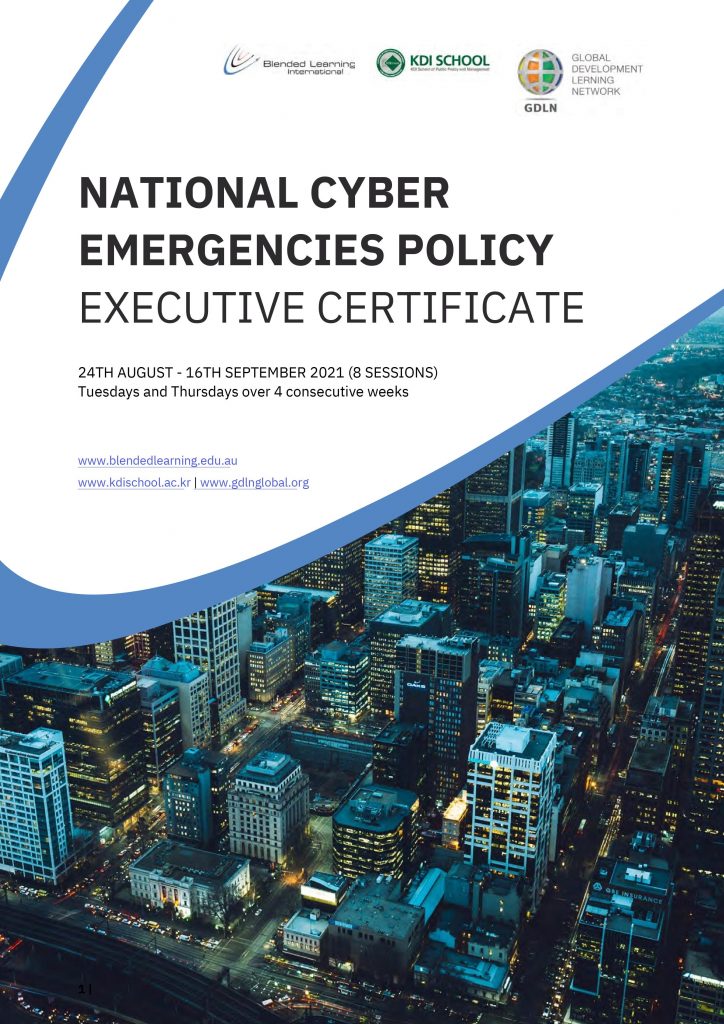NATIONAL CYBER EMERGENCIES POLICY: EXECUTIVE CERTIFICATE AUGUST 2021
NATIONAL CYBER EMERGENCIES POLICY: EXECUTIVE CERTIFICATE AUGUST 2021
CLICK HERE TO SEE THE FULL BROCHURE FOR THIS COURSE

WHY THIS COURSE?
The Global Development Learning Network (GDLN) is helping to support Executive Certificates as a new initiative which commenced in 2020. It is working with GDLN affiliates, the Korea Development Institute School of Public Policy and Management (KDIS) and Blended Learning International, for this course accreditation and delivery. The focus for this course is National Cyber Emergencies Policy.
In response to the challenges of COVID-19, GDLN convened a series of webinars and executive courses around the globe to assist in 2020 and early 2021. Countries everywhere are still grappling with this pandemic and its consequences. But countries everywhere are also now highly attuned to the need to be prepared for other new challenges. Pre-eminent amongst these, in the modern digital era, is cyber security.
At the highest level, cyber emergency policy affects communities, business, governments, regional relationships, and international security. This new course equips participants to engage more effectively with the demands of resilience planning for such situations. The world has witnessed an escalating sense of crisis around state-sponsored cyber attacks since 2015, which was when the United States first declared a national emergency in cyberspace. Critical infrastructure in every country is being attacked regularly. There has been a shift for many governments, from a focus on cooperative resilience-oriented approaches at national level to more highly regulated, state-led civil defence initiatives. But the shift is far from universal. The course addresses a number of key thematic issues to demonstrate a disconnect between the deepening sense of vulnerability and the availability of viable solutions at the national level.
The Executive Certificate course is to be delivered online in twice weekly sessions over four weeks. Each of these sessions is 90 minutes (45 minutes Foundation Sessions + 45 minutes Application Sessions). The Certificate award is to be validated on course participation, but no further assessment is required at this executive level. The course has been designed to meet standards required for KDIS endorsement and accreditation.
The earlier webinars and executive courses on Pandemic and Resilience Policy were very well-received. Course evaluation was ninety-five percent plus excellent. With respect to different time zones, this course will be delivered directly for the Asia-Pacific region, but those in other regions are very much encouraged to participate and supportive out-of-session arrangements can be made.
The National Cyber Emergencies Policy course has also been offered once before and is being offered again in response to the positive feedback.
COURSE, CONTENT & APPROACH
The course is to be delivered live online. It is being coordinated by ANU Professor Glenn Withers, GDLN Global Board Chair, advised by Professor Greg Austin, from the International Institute of Strategic Studies (IISS), Singapore, and editor of National Cyber Emergencies, Routledge, London, 2020. Additional expert presenters join the course from countries in the Asia-Pacific region and around the world.
Each ninety minute session provides first a framework for resilience followed by an expert application from experience of major cyber emergencies. The course is delivered in English.
Upon completion of this course, participants will be able to understand the:
- International and national approaches in national cyber and emergency policy,
- Importance of multi-dimensional analytic approaches (economic, social and environmental),
- Centrality of the human perspective, alongside engineering, science and technology
- Linkage between preparedness, response, recovery, and longer term management,
- Lessons of success and failure in national cyber emergencies policy, and
- Commonalities in cyber policy for quite distinct threats.
PROPOSED TOPICS
INTRODUCTION
- Course Introduction
- Cyber Security Introduction
FOUNDATION SESSIONS
- Cyber Security Knowledge for Resilience
- Scenarios for Cyber-Related Technology of the Future
- Cyber Security Management of Critical Energy Infrastructure
- Attack Forms: Ransomware
- Communication and Leadership on Cyber Emergency
- International Influence on National Cyber Emergency Policy
- Policy Responses: Local, National, or Alliance?
- Cyber-Security Education
APPLICATION SESSIONS
- National Cyber-Security Policy in Korea
- European Cyber Policy
- Comparative Group Stakeholder Analysis for Cyber Policy
- Cyber Entanglement Case Studies for India and China
- Disinformation in Australia
- Korean Experience in Technology and Security Preparedness
- Economic and Social Dimensions of Cyber Emergencies
- Global Experience in ICT Education
- Cyber Security Initiatives: a Sri Lankan Perspective
PROPOSED SPEAKERS*
- Professor Greg Austin – IISS Singapore & Social Cyber Group
- Professor Yun Haiyoung – Korea Development Institute School
- Dr. So Jeong Kim, National Security Research Institute, Korea
- Dr. Lee Jeong-Min – Korea Internet and Security Agency
- Adam Henry – Accenture Australia
- Lisa Materano – Blended Learning International
- Dr. Kanishka Karunasena – Head of Research, Policy and Projects, Sri Lanka CERT
- Karine Pontbriand – University of NSW Canberra
- Matt Ryan – APRA & UNSW Canberra
- Tom Sear – University of NSW Canberra
- Dr. Eneken Tikk – Cyber Policy Institute, Finland
- Professor Glenn Withers – ANU & Social Cyber Group
- Jaeson Yoo – Chief Strategy Officer, Autocrypt Co Ltd., Korea
*Subject to final confirmation.
COURSE ARRANGEMENTS
COURSE DATES AND TIMES
Tuesday 24 Aug, 17:00 – 18:30 AEST Tuesday 7 Sept, 17:00 – 18:30 AEST
Thursday 26 Aug, 17:00 – 18:30 AEST Thursday 9 Sept, 17:00 – 18:30 AEST
Tuesday 31 Aug, 17:00 – 18:30 AEST Tuesday 14 Sept, 17:00 – 18:30 AEST
Thursday 2 Sept, 17:00 – 18:30 AEST Thursday 16 Sept, 17:00 – 18:30 AEST
*Please check local relevant time zones to match AEST (Australian Eastern Standard Time).
COURSE SCHOLARSHIP
KDIS Scholarship applications to cover the full fee are available for participants nominated by GDLN affiliates. Please contact Lisa Materano as indicated below for more information. Applications closing date for scholarships is Tuesday August 17th 2021 , but late applications are welcome and will certainly be considered if positions are still available.
Participants who work in cyber emergency related employment are especially welcome, but the course is also fully accessible to participants from all backgrounds.
OTHER COURSE ENTRY
A fee of $500 USD may also be paid to obtain participation for those not supported by KDIS
Scholarships. For group enrolments, fee details will be provided upon request.
CONTACT INFORMATION
LISA MATERANO
[email protected]
Mobile & WhatsApp: +61 438 134 558
WeChat: LisaMaterano
PROGRAM*
*Subject to final confirmation of Previous Speakers
*FS: Foundation Session, AS: Application Session
Tuesday 24 Aug, 17:00 – 18:30 AEST
Course Introduction: Ms Lisa Materano, BLI; Professor Yun Haiyoung, KDIS
FS1: Cyber Security Knowledge for Resilience: Professor Greg Austin, International Institute of
Strategic Studies (IISS) Singapore & Social Cyber Group (SCG)
AS1: National Cyber Policy in Korea: Dr. Jeong-Min Lee, Principal Researcher, Korea Internet and
Security Agency
Thursday 26 Aug, 17:00 – 18:30 AEST
FS2: Scenarios for Cyber-Related Technology of the Future: Professor Glenn Withers,
The Australian National University (ANU) & SCG
AS2: European Cyber Policy: Dr Eneken Tikk, Cyber Policy Institute, Finland
Tuesday 31 Aug, 17:00 – 18:30 AEST
FS3: Energy Infrastructure and Cyber Resilience: Professor Greg Austin, IISS Singapore & SCG
AS3: Stakeholder Analysis for Cyber Policy: Professor Glenn Withers, ANU & SCG
Thursday 2 Sept, 17:00 – 18:30 AEST
FS4: Global Cybersecurity, Ransomware Attacks and Organisation Policy: Matt Ryan, Australia
Prudential Regulation Authority
AS4: Cyber Entanglement: The US/China Case: Karine Pontbriand, Montreal Institute of Strategic
Studies and UNSW Canberra
Tuesday 7 Sept, 17:00 – 18:30 AEST
FS5: Communication and Leadership on Cyber Emergency: Professor Glenn Withers, ANU & SCG
AS5: Disinformation in Australia: Tom Sear, Industry Fellow, UNSW Canberra
Thursday 9 Sept, 17:00 – 18:30 AEST
FS6: The Tokyo Olympics and Society 5.0: Adam Henry, Accenture Australia
AS6: Cyber Strategies in the Context of National Security: Dr. So Jeong Kim, Principal Researcher & Director of Cyber Security Policy Research Department, National Security Research Institute, Korea
Tuesday 14 Sept, 17:00 – 18:30 AEST
FS7: Policy Responses: Local, National, Alliance: Professor Greg Austin IISS Singapore and SCG
AS7: Cyber Security Initiatives: Sri Lankan Perspective, Dr Kanishka Karunasena, Sri Lanka CERT.
Thursday 16 Sept, 17:00 – 18:30 AEST
FS8: Cyber-Security Education: Adam Henry, Accenture Australia
AS8: The Future of Cybersecurity: From Networks to Web to IoT: Jaeson Yoo, Chief Strategy Officer, Autocrypt Co Ltd, Korea

